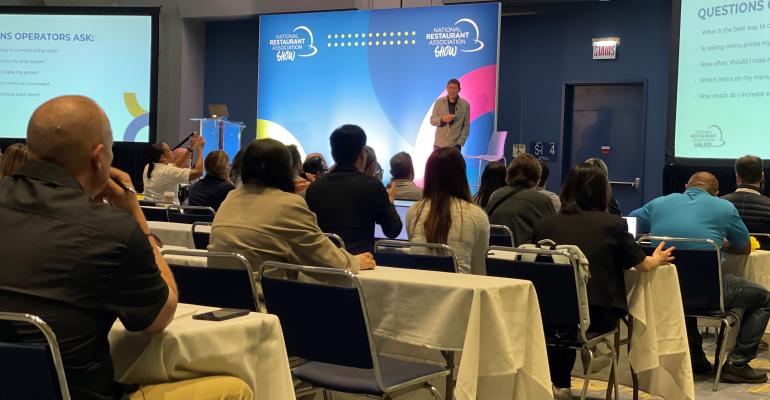Of surprise to no one, a major theme emanating from the National Restaurant Association Show floor is pricing. Operators are looking for solutions to protect their margins as input costs continue to elevate, but consumers seem to be reaching their pricing threshold as evidenced by recent traffic erosion. So, what’s the solution?
According to Ray Villaman, CEO/owner of the Tahoe Restaurant Group, there are ways to strike the right balance and it comes down to three key strategies:
- Understanding how to classify all menu items in order to adjust prices accurately.
- Implementing recipe costing cards and a kitchen waste sheet.
- Learning negotiating tactics to lower vendor prices.
Villaman provided a playbook to implement these strategies during a packed educational session Saturday titled, “Raise Menu Prices or Lower Food Costs?” To start, it’s important to understand sales projections, which he derives by looking at year-over-year plus the previous three weeks’ worth of sales.
“You have to know your food cost and your labor cost targets,” he said. “Prime costs are everything in a restaurant. Projections are how we run our business.”
Once those projections are in place, classify your menu so you can identify where your profits are coming from. As you examine your menu, Villaman said, categorize each item into four categories: Gold, which is high volume, high profit; silver, which is high volume, low profit; bronze, which is low volume, high profit; and dogs, which are low volume, low profit.
“We encourage you to replace, get rid of, turn over, or try new things with the dogs,” Villaman said.
Silver items, however, are where you should attack pricing first because the items are popular, so you can risk a little decline in volume to try and raise profits.
“If you’re raising your silver menu items, you’re going to increase margins. You’re never going to promote something when your profitability is low,” Villaman said. “We’re always trying to adjust.”
From there, operators should create recipe costing cards, which indicate the exact cost of each item on the menu. Costing cards, Villaman said, determine which items to highlight, remove, where to increase prices or adjust portion sizes. Also, it’s critical to always know what your competitive set is doing in the market, so you don’t risk pricing yourself out. While part of the pricing equation is a science, part of it is also an art. That’s where menu engineering comes in.
“Think of your menu in a way that is most attractive to your audience. Highlight or create specials on your menu based on the item’s classification. Once you know your high profit drivers, highlight them and train the staff to promote them,” Villaman said.
And, look for a buying group opportunity in your area. Villaman’s restaurants are part of a group purchasing organization, for instance, which provides much greater purchasing power.
“In the first year as part of that GPO, we saved over $300,000 toward our bottom line,” he said.
Finally, consider your vendor relationships and compare prices every week with competing distributors. Villaman said prices change often and “a lot of times the vendor will treat an operator differently depending on volume.”
Suppliers will also care if you’re helping them by ordering more efficiently and less often.
“Ask for opportunities to buy bulk discount purchases. Reduce your number of drops per week. Pay your vendor on time and commit to a minimum order size in terms of a dollar amount,” Villaman said. “Ask for reduced pricing from your suppliers based on a win/win solution. They’re going to meet you at the table if you go to them and say ‘I want to be a good client, how can we work together to reduce pricing? I’m getting killed on food costs.’”
Contact Alicia Kelso at [email protected]





